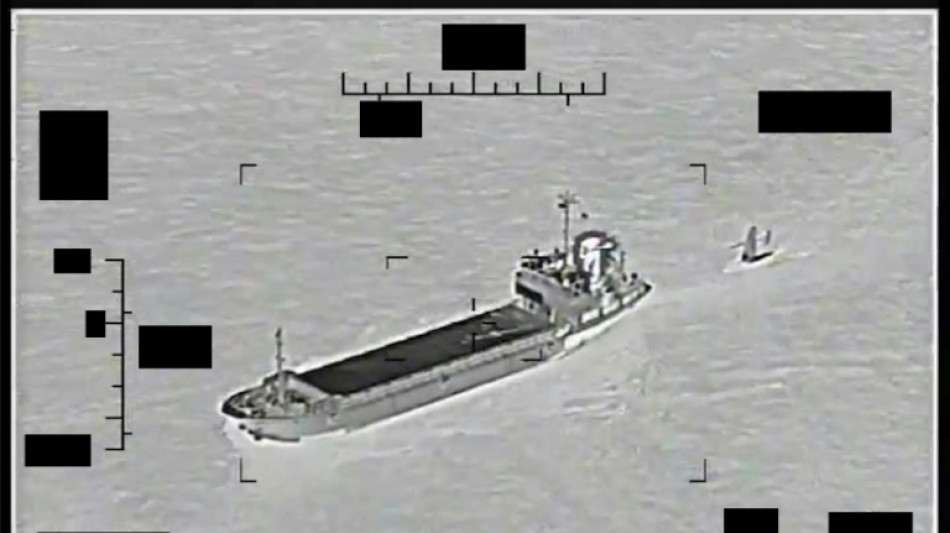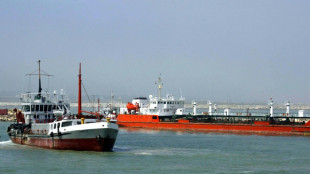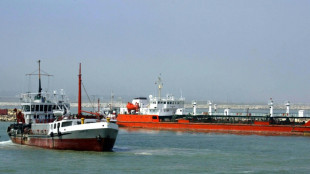
-
 US to take three-quarter stake in Armenia corridor
US to take three-quarter stake in Armenia corridor
-
Semenyo an instant hit as Man City close on League Cup final

-
 Trump warns of 'very strong action' if Iran hangs protesters
Trump warns of 'very strong action' if Iran hangs protesters
-
Marseille put nine past sixth-tier Bayeux in French Cup

-
 US stocks retreat from records as oil prices jump
US stocks retreat from records as oil prices jump
-
Dortmund outclass Bremen to tighten grip on second spot

-
 Shiffrin reasserts slalom domination ahead of Olympics with Flachau win
Shiffrin reasserts slalom domination ahead of Olympics with Flachau win
-
Fear vies with sorrow at funeral for Venezuelan political prisoner

-
 Pittsburgh Steelers coach Tomlin resigns after 19 years: club
Pittsburgh Steelers coach Tomlin resigns after 19 years: club
-
Russell eager to face Scotland team-mates when Bath play Edinburgh

-
 Undav scores again as Stuttgart sink Frankfurt to go third
Undav scores again as Stuttgart sink Frankfurt to go third
-
Fuming French farmers camp out in Paris despite government pledges

-
 Man Utd appoint Carrick as manager to end of the season
Man Utd appoint Carrick as manager to end of the season
-
Russia strikes power plant, kills four in Ukraine barrage

-
 France's Le Pen says had 'no sense' of any offence as appeal trial opens
France's Le Pen says had 'no sense' of any offence as appeal trial opens
-
JPMorgan Chase reports mixed results as Dimon defends Fed chief

-
 Vingegaard targets first Giro while thirsting for third Tour title
Vingegaard targets first Giro while thirsting for third Tour title
-
US pushes forward trade enclave over Armenia

-
 Alpine release reserve driver Doohan ahead of F1 season
Alpine release reserve driver Doohan ahead of F1 season
-
Toulouse's Ntamack out of crunch Champions Cup match against Sale

-
 US takes aim at Muslim Brotherhood in Arab world
US takes aim at Muslim Brotherhood in Arab world
-
Gloucester sign Springbok World Cup-winner Kleyn

-
 Trump tells Iranians 'help on its way' as crackdown toll soars
Trump tells Iranians 'help on its way' as crackdown toll soars
-
Iran threatens death penalty for 'rioters' as concern grows for protester

-
 US ends protection for Somalis amid escalating migrant crackdown
US ends protection for Somalis amid escalating migrant crackdown
-
Oil prices surge following Trump's Iran tariff threat

-
 Fashion student, bodybuilder, footballer: the victims of Iran's crackdown
Fashion student, bodybuilder, footballer: the victims of Iran's crackdown
-
Trump tells Iranians to 'keep protesting', says 'help on its way'

-
 Italian Olympians 'insulted' by torch relay snub
Italian Olympians 'insulted' by torch relay snub
-
Davos braces for Trump's 'America First' onslaught

-
 How AI 'deepfakes' became Elon Musk's latest scandal
How AI 'deepfakes' became Elon Musk's latest scandal
-
Albania's waste-choked rivers worsen deadly floods

-
 Cancelo rejoins Barca on loan from Al-Hilal
Cancelo rejoins Barca on loan from Al-Hilal
-
India hunts rampaging elephant that killed 20 people

-
 Nuuk, Copenhagen mull Greenland independence in Trump's shadow
Nuuk, Copenhagen mull Greenland independence in Trump's shadow
-
WHO says sugary drinks, alcohol getting cheaper, should be taxed more

-
 Arteta urges Arsenal to learn from League Cup pain ahead of Chelsea semi
Arteta urges Arsenal to learn from League Cup pain ahead of Chelsea semi
-
Davos elite, devotees of multilateralism, brace for Trump

-
 Spanish star Julio Iglesias accused of sexual assault by two ex-employees
Spanish star Julio Iglesias accused of sexual assault by two ex-employees
-
Trump's Iran tariff threat pushes oil price higher

-
 US consumer inflation holds steady as affordability worries linger
US consumer inflation holds steady as affordability worries linger
-
Iran to press capital crime charges for 'rioters': prosecutors

-
 Denmark, Greenland set for high-stake talks at White House
Denmark, Greenland set for high-stake talks at White House
-
Iranian goes on trial in France ahead of possible prisoner swap

-
 Cold winter and AI boom pushed US emissions increase in 2025
Cold winter and AI boom pushed US emissions increase in 2025
-
Hong Kong activist investor David Webb dies at 60

-
 Try to be Mourinho and I'll fail: new Real Madrid coach Arbeloa
Try to be Mourinho and I'll fail: new Real Madrid coach Arbeloa
-
Vingegaard targets Giro d'Italia and Tour de France double

-
 South Korean prosecutors demand death penalty for ex-leader Yoon
South Korean prosecutors demand death penalty for ex-leader Yoon
-
Iwobi hails Nigerian 'unity' with Super Eagles set for Morocco AFCON semi


Pentagon combines sea drones, AI to police Gulf region
Iran's recent seizure of unmanned US Navy boats shined a light on a pioneering Pentagon program to develop networks of air, surface and underwater drones for patrolling large regions, meshing their surveillance with artificial intelligence.
The year-old program operates numerous unmanned surface vessels, or USVs, in the waters around the Arabian peninsula, gathering data and images to be beamed back to collection centers in the Gulf.
The program operated without incident until Iranian forces tried to grab three seven-meter Saildrone Explorer USVs in two incidents, on August 29-30 and September 1.
In the first, a ship of Iran's Islamic Revolutionary Guard Corps hooked a line to a Saildrone in the Gulf and began towing it away, only releasing it when a US Navy Patrol boat and helicopter sped to the scene.
In the second, an Iranian destroyer picked up two Saildrones in the Red Sea, hoisting them aboard.
Two US Navy destroyers and helicopters quickly descended, and persuaded the Iranians to give them up the next day, but only after stripping cameras from them, according to the US military.
The Iranians said the USVs were in international shipping lanes and were picked up "to prevent possible accidents."
The US Navy said the USVs were operating well out of shipping lanes and unarmed.
Vice Admiral Brad Cooper, commander of US Naval Forces Central Command, called the Iranian actions "flagrant, unwarranted and inconsistent with the behavior of a professional maritime force."
US forces "will continue to fly, sail and operate anywhere international law allows," he added.
- One year at sea -
The drones are operated by the Bahrain-based US 5th Fleet's Task Force 59, created last year to integrate unmanned systems and artificial intelligence into Middle East operations.
Airborne and subsea drones are pretty well developed and proven, but unmanned surface boats are much newer and yet essential for the future, 5th Fleet spokesman Commander Tim Hawkins told AFP.
Since starting last year, the US Navy and regional partners have deployed both slow USVs like Saildrones and battery-powered speedboats like the Mantas T-12.
Equipped with solar panels and sail wings, the Saildrones carry multiple sensors and cameras, and are designed to spend up to a year at sea transmitting data by satellite.
San Francisco-based Saildrone operates around 100 vessels around the world for clients including the Pentagon, major oceanographic institutes, meteorological agencies, and groups studying fisheries and pollution.
"Having circumnavigated Antarctica in 2019 and then having sailed through the eye of a category-four hurricane last year, there really isn’t any maritime environment our drones cannot operate," said Saildrone spokeswoman Susan Ryan.
- Focus on Iranian activities -
In the Gulf, Hawkins would only say that they collect information for "enhancing our vigilance of the surrounding seas and strengthening our regional deterrence posture."
But Iranian activities are likely the main target.
Iran also patrols the region and has accosted and seized foreign commercial vessels and harassed US Navy ships in several tense confrontations in recent years.
The US Navy has sought to prevent Iran from shipping weapons to Yemen's Houthi rebels and other groups, and also helps enforce sanctions on Iran.
The key, Hawkins said, is taking the information collected from all sorts of unmanned sources, in the air, on the ground and on the sea, and making sense of it quickly.
Artificial intelligence helps identify unusual activity, like unnoticed vessels, in the USV data that human observers might miss.
"You need artificial intelligence to pick out what warrants more attention," he said.
- No secret -
Hawkins said it was unclear why only after a year into the program that the Iranians suddenly decide to try to retrieve some Saildrones.
None of what the US is doing is secret, he noted.
The program was announced last September, and in February the 5th Fleet hosted International Maritime Exercise 2022, which brought together 10 countries and more than 80 USVs to try out in the Gulf.
Even so, the US chose to place Task Force 59 in the tension-filled Gulf instead of another less challenging region, and the activities apparently have Tehran bothered.
The US military says the program is in part about developing tactics and doctrines for operating USVs, including learning how to deal with a country like Iran trying to grab them off the sea.
Right now the US operates them with manned surface vessels nearby to deal with interference.
"You can't just go pick up stuff out of the ocean that has a country's flag on it," said one US official.
"If it's the sovereign property of our nation, they have to give it over," the official said.
R.Halabi--SF-PST



